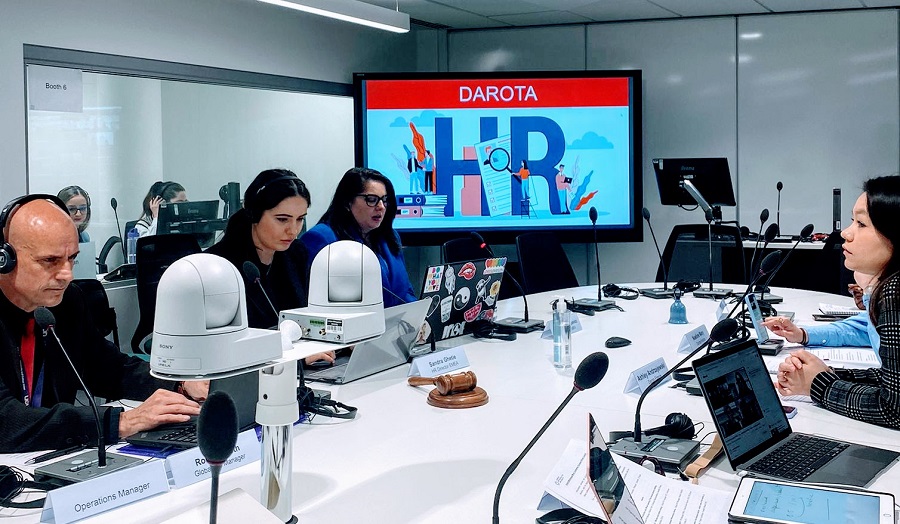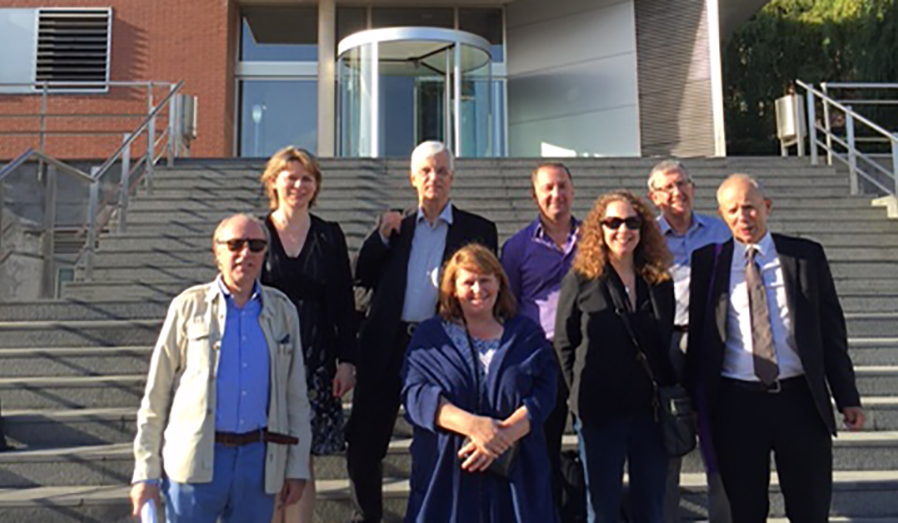Apply for this course
Please select when you would like to start:
Use the apply button to begin your application.
If you require a Student visa and wish to study a postgraduate course on a part-time basis, please read our how to apply information for international students to ensure you have all the details you need about the application process.
Why study this course?
This International Business Management with Project Management MSc degree will give you a systematic understanding of business organisations, their external environment and how they create value sustainably, with a special focus on the area of project management. The degree programme focuses on providing knowledge for practical use, allowing you to develop business management skills that will enhance your career. Guided by our staff, you'll learn the theory and practice of business management.
We're sixth in the country for producing the most CEOs and managing directors, according to a study by Hitachi Capital Invoice Finance.
Our business and management courses are ranked first for teaching quality in the Guardian University Guide 2023.
Also, our International Business Management with Project Management MSc is accredited by Association for Project Management (AMP). AMP is the only chartered membership organisation for the project profession in the world.
Sixth in the country for producing CEOs
We're sixth in the country for producing the most CEOs and managing directors, according to a study by Hitachi Capital Invoice Finance
Business simulations
Competing in groups with other students, you'll experiment with business strategies, test business ideas and experience the consequences of your actions in a virtual simulated business environment
Ranked first for teaching quality
Our business and management courses are ranked first for teaching quality in the Guardian University Guide 2023
Course modules
The modules listed below are for the academic year 2024/25 and represent the course modules at this time. Modules and module details (including, but not limited to, location and time) are subject to change over time.
Year modules
International Business Strategy with Simulation
This module currently runs:autumn semester - Wednesday morning
autumn semester - Wednesday afternoon
autumn semester - Thursday morning
autumn semester - Thursday afternoon
autumn semester - Friday morning
autumn semester - Friday afternoon
(core, 20 credits)
Business strategy addresses the choices firms make as they set their mission and goals, make decisions in relation to positioning and which markets to enter, and develop their business models. They do this in the context of the external environment, addressing changes in technology, government intervention, competitor actions, customers and markets.
This module aims to:
- Provide a context for current strategic and social issues raised by technology change
- Enable students to develop an understanding of business purpose, strategy and strategy development and to understand how this applies in global organisational contexts for both small and large businesses.
- Develop the knowledge and skills to analyse the current and future business environment through the recognition of changes and trends, and the construction of scenarios
- Introduce the importance of resources and capabilities and develop students’ abilities to critically evaluate their importance as sources of sustainable competitive advantage but also as potential sources of disadvantage when disruptive innovation occurs
- Develop critical awareness of the importance of stakeholders including governments, societies, suppliers and employees, and the need for corporate governance, ethical decision making and corporate responsibility.
- Develop an understanding of managerial decision making with limited information and industry uncertainty through participation in a business simulation.
A key element of the module is participation in the business simulation in which students will compete against each other in terms within a simulated global marketplace.
Read full detailsOperations and Technology Management
This module currently runs:autumn semester - Tuesday morning
autumn semester - Tuesday afternoon
autumn semester - Wednesday morning
autumn semester - Wednesday afternoon
autumn semester - Thursday morning
autumn semester - Thursday afternoon
(core, 20 credits)
Operations and Technology Management is core to two MSc Pathways, MSC International Business Management and MSC International Business Management with Project Management.
A business adds value through its operations, but only in combination with others in the value network or eco-system, critically linked by the use of technology. Matching internal operations capabilities to changing market (and regulatory) requirements, whilst responding to a tidal wave of data from suppliers, customers and digital platforms involves operations in strategy, design, planning and control, supply chain, improvement techniques like lean but also the technology to connect and join up the dots to capture value.
The module aims to equip students with a broad understanding of operations and technology management that will make them stand out from their peers through being able to grasp how value is being created. The potential for AI and robotics to further increase the use of technology in the operational domain is already clear, whether using AI in legal processes or in robots that flip burgers, an understanding of the links between technology and operations is critical for anyone aspiring to be a business manager, owner or entrepreneur. Analysis is the core of the module, for example through process mapping, and problem solving using both case studies and other active learning exercises.
On successful completion of this module:
- You will understand the basis of the value Operations and Technology Management creates in any organization in any sector
- You will be able to recognize the key concepts and principles of operations and technology management that need to be implemented to support that value creation approach.
- You will be able to critically assess various techniques of product, service design and improvement, deploying a contingent approach to what works best and where
- You will be able to apply appropriate Supply Chain Management techniques in the light of your new knowledge of the scope (and management of) of inter-organisational co-operation
- You will be able to evaluate the necessary trade-offs that have to be made between operations management performance objectives and achievable performance
Business Consultancy Project-portfolio assessment
This module currently runs:summer studies - Friday morning
autumn semester - Friday morning
spring semester - Friday morning
(alternative core, 60 credits)
This module provides you with the opportunity to work on specific business issues that organisations are facing. Utilising your competences of handling and managing business challenges, starting from problem identification and concluding with solution-related recommendations, thus encouraging research into real world business issues impacting organisations.
Useful and applied business research, like useful reflection, leads to change. To that end, students will be encouraged to take a pragmatic approach to their research, seeking always to create actionable conclusions of value to business managers, owners and entrepreneurs.
The aims of the module are to:
1. Foster a critical awareness and deep interest in a management/business issue or topic associated with their subject specialist area and to combine knowledge and analyses acquired in modules to explore that topic in depth
2. Enable students to produce a full business research report and a management summary on an appropriate topic to a professional and engaging standard that provides the basis for action.
3. Encourage reflection to critically evaluate the success of a business-related project and assess personal competence in the light of current knowledge and skills.
4. Build each student’s knowledge and confidence in their chosen subject to facilitate employability.
The expectation is that students will undertake research in areas of interest to them that is in context to their chosen programme and that develops knowledge and skills that support employment. Examples of possible areas of research include:
• Evaluation of an opportunity to enter a new market e.g. is it feasible for a low cost airline to enter the market in Brazil?
• Evaluation of a specific firm’s strategy and performance e.g. how is Ford responding to the advent of electric vehicles, driverless technology and ride sharing?
• Analysis of the impact of technology change on a company, industry or sector e.g. how will driverless technology and ride sharing impact on car ownership?
• Analysis of trends to create potential strategic scenarios for a firm or industry e.g. what are the future scenarios for law firms in the light of the adoption of AI?
• Analysis of competition in a specific market or industry e.g. global competition in the rapidly growing e-bike industry
• Identifying solutions to a specific business problem e.g. with a small or medium sized business e.g. what needs to be done to grow the business to the next level
• Analysis of disruption in an industry and the implications for a specific incumbent e.g. how should a black cab driver respond to Uber and other ride sharing platforms?
• Analysis of the effect of government intervention in a particular industry e.g. the current trade dispute over subsidies to Boeing and Airbus
• Response from Banks and FIs to the changing customer interaction and business landscape in the post pandemic era
Dissertation
This module currently runs:summer studies - Wednesday afternoon
autumn semester - Monday evening
spring semester - Wednesday evening
(alternative core, 60 credits)
This module provides students with the opportunity to undertake research projects on specific research questions related to their course.
Students will critically investigate issues cognate to their programme of study. The aim will be to make proposals or recommendations for the future and / or a contribution to extant theory.
Students are expected to utilise appropriate investigative techniques and standards of data collection and analysis as they write their postgraduate research-based dissertation.
The dissertation will be 10,000 words in length.
The dissertation module has the following aims:
1. To facilitate a detailed investigation of one area or topic within the subject field;
2. To develop a thorough analysis and synthesis of theory, policy and practice in relation to the chosen topic;
3. To provide an opportunity for critical reflection on the research topic.
The expectation is that students will undertake research in areas of interest to them that is in context to their chosen course; the research supervisor will be allocated by the subject area within which the course is located.
Read full detailsInternational Logistics
This module currently runs:spring semester - Monday morning
spring semester - Monday afternoon
spring semester - Thursday afternoon
spring semester - Thursday morning
summer studies - Monday morning
summer studies - Monday afternoon
(alternative core, 20 credits)
This module will enable you to understand the actual processes of the exchange of goods and services between partners in global trade, and the logistical arrangements within transnational corporations across state and regional boundaries. The focus will be on the economic imperatives which have influenced the development of global supply chain management, the micro-economic dynamics affecting the transport and logistics sector and the disruptive trends which are transforming the industry. It will include increasingly relevant concerns such as ethics and sustainability in global supply chains and the importance of understanding risk, especially in developing markets.
The module aims to introduce you to the different theories, methodologies and data sources which will allow you to monitor and understand the logistical strategies developed by the major global producers and consumer goods intermediaries. These connections and processes are part of the development of global trade and economic growth, and have profound consequences for economic and social development.
The aims of the module are:
1 To provide you with an understanding of the nature of logistics studies.
2 To ensure that you are able to explain the different theories and techniques applied to the study of logistics
3 To enable you to understand the types of logistics companies and the processes they use in moving goods around the world.
4 To define and explain to you supply chain management concepts, such as the trade-off between inventory and transport costs, which have influenced the production strategies of multinational enterprises.
5 To outline the types of technologies used to provide visibility in the supply chain and increase efficiency.
6 To provide an overview of the disruptive innovations which are being developed to make international logistics more efficient, and the impact these will have on supply chain strategy.
7 To explain the increased level of risk, which has evolved through the relocation of production processes to developing countries and how multinational enterprises should deal with it. Global waste recycling issues.
8 To provide a background to the increasingly important role which ethical and environmental factors play in the development of sustainable and economically viable supply chains. The circular economy.
Read full detailsInternational Project Management Practice
This module currently runs:autumn semester - Monday afternoon
spring semester - Tuesday morning
spring semester - Tuesday afternoon
spring semester - Wednesday afternoon
spring semester - Wednesday afternoon
spring semester - Thursday morning
spring semester - Thursday afternoon
(alternative core, 20 credits)
Project management practice in the US and Europe is set out in a number of methods and bodies of knowledge (BOK) including the:
- US Project Management Institute’s PMBOK
- UK Association of Project Managers APMBOK
- best practice guides published by the UK Government that have built on the PRINCE method and now include Programme Management, Risk Management and Agile,
- Dynamic System Development Method (DSDM) Project Management developed by the Agile Business Consortium.
This module deals with the core activities of project management as set out in the APM BOK version 7, making comparisons with the PMBOK and PRINCE. The focus is primarily on managing a highly predictive project where the output is clearly defined and understood, for example a building construction project. Consideration is also given to projects where the solution emerges in an iterative or evolutionary way and so Agile methods are also introduced.
Students will develop the ability to create, manage and close projects effectively, and to make use of project management software. The module will introduce relevant theories and research in relation to projects as temporary social organisations, the categorisation of project types, the nature and management of risk, and the importance of stakeholder communication and management.
Read full detailsStrategic Programme, Portfolio and Project Management
This module currently runs:spring semester - Monday morning
spring semester - Monday afternoon
spring semester - Tuesday morning
spring semester - Tuesday afternoon
(alternative core, 20 credits)
In this Module you will learn about the links between strategy execution and programme, project and portfolio Management (P3M). You will examine P3M theory and practice, and theories of the management of change, including the construction of the business case for a programme.
Examples of international P3M theory and practice will be explored through case studies and examples of business programmes and projects e.g.:
- Heathrow Terminal 5 – contracting and risk management in construction.
- Berlin International Airport, NPfIT (Connecting for Health) and Crossrail – major programme and project failures.
- Organisational P3M maturity models and the role of Knowledge Management
- The consideration of climate change in major infrastructure projects
- New product development
- Outsourcing, near-shoring and offshoring
- Major system implementation e.g., ERP, CRM and Platforms
- Making a major sale.
You will be able to analyse and evaluate:
- The relationships between the programme lifecycle and the technical life cycles of differing programme types.
- The business case for a programme.
- Approaches to designing programme organisations, their governance and stakeholder management.
- The differences and similarities between various types of business programmes
- The development of organisational P3M capabilities based on effective knowledge management.
- The factors that lead to programme cost and budget over-runs and reduced benefits realisation.
- Approaches to managing sensitive programmes.
The module runs in parallel with International Project Management Practice.
Read full detailsData Warehousing and Big Data
This module currently runs:autumn semester - Thursday morning
(option, 20 credits)
The module aims to strengthen your skills in data technologies ranging from database and data warehousing to Big Data. First, it will provide you with good understanding of database concepts and database management systems in reference to modern enterprise-level database development. Once gaining good skills in database development, you will be able to study and gain an in-depth understanding of data warehousing which include concepts and analytical foundations as well as data warehousing development. Through intensive hands-on sessions, you will be able to get familiar with related technological trends and development in the field. The module will leverage a portfolio of SQL server tools such as, SQL Server Management Studio (SSMS) and Azure Data Studio, to provide hands-on experience in implementing a reporting solution through a combination of assignments and lab exercises.
The module introduces also the foundation of Big data management based on Apache Hadoop platform and provides you with a broad introduction to Big Data technologies. This will involve hands-on sessions, designed for data analysts, business intelligence specialists, developers, administrators, or anyone who has a desire to learn how to process and manage massive and complex data to infer knowledge from data. Topics include Hadoop, HDFS, MapReduce using tools such as Hive, Pig and Zeppelin for hands-on experience.
Digital Marketing and Social media
This module currently runs:spring semester - Monday afternoon
spring semester - Wednesday morning
spring semester - Wednesday afternoon
spring semester - Thursday morning
spring semester - Friday morning
(option, 20 credits)
This module will equip you with Masters-level skills and awareness of the challenges and opportunities within the everchanging digital ecosystem. You will be able to critically explore the theoretical frameworks and models which are relevant to digital and social media marketing practice. You will look at the development and planning of supporting technologies for digital marketing and examine digital channels and their suitability for inclusion for effective integrated marketing programmes and campaigns.
The module aims to:
- enable you gain a comprehensive understanding of digital and social media marketing techniques applicable to marketing theory and practice, research and advanced scholarship.
- provide you with an understanding and the development of critical awareness of current theoretical research in digital and social media for the evaluation and effectiveness of different tools and technologies in digital and social media marketing.
- enhance your cognitive/intellectual, transferable digital practical skills and applied decision-making skills needed successful career in digital and social media marketing.
Read full detailsEconomics of International Trade
This module currently runs:autumn semester - Thursday evening
(option, 20 credits)
This a core one semester module delivered on MSc International Trade and Finance course and as an option on other courses in the subject area. The focus of the module is on the international trade and economic theory. The topics that will be covered in the module include the benefits and reasons for international trade, patterns of international trade, reasons for protectionism, trade barriers, welfare effects of international economic policies, forms of regional economic integration, balance of payments, and determinants of exchange rates. The module will draw on the current research and empirical studies, and examine theoretical and contemporary policy issues and current debates in the international economy. It will also consider the issues and controversies that surround these activities, and illustrate the links between the theoretical concepts and practical realities.
The module also aims to develop a number of transferable skills of students, e.g. strategic thinking, problem solving, oral and written communication skills, subject research, quantitative and analytical skills.
Note: If there are not sufficient student numbers to make a module viable, the School reserves the right to cancel such a module. If the School cancels a module it will use its reasonable endeavours to provide a suitable alternative.
Read full detailsEnvironmental Economics and Investment
This module currently runs:autumn semester - Tuesday evening
(option, 20 credits)
Environmental Economics and Investment is a Level 7 module which is core to MSc Corporate Social Responsibility and Sustainability. It is one of the optional Economics modules studied on other courses.
The Environmental Economics and Investment module considers in depth the issues faced by governments and businesses in the face of climate change and other global trends in relation to the environment and the economy. It extends their understanding of the complex and critical relations between man and nature in the processes of economic reproduction.
The module assesses the standard economic principles in their use as tools to investigate the causes, consequences and the possible solutions to problems of environmental degradation and climate change. The three major themes in the module are (i) the determination of the ‘optimum’ levels of environmental resource usage (ii) the analyses of alternative ways of attaining those targets and (iii) the impact of these actions on business decision making.
The crucial notion of 'sustainability' is a key to the investigation. So are the proximate and underlying causes of environmental problems. The main aim of the module is to introduce students to the established economists’ way of analysing environmental problems, and to explore the evolving methodologies prompted by the environmental crisis now upon us.
Note: If there are not sufficient student numbers to make a module viable, the School reserves the right to cancel such a module. If the School cancels a module it will use its reasonable endeavours to provide a suitable alternative.
Read full detailsInternational Corporate Finance
This module currently runs:autumn semester - Wednesday evening
(option, 20 credits)
This module explores the theoretical underpinnings and empirical evidence concerning the activities of corporate finance from an international perspective. The module offers students the opportunity to develop their knowledge in a range of areas related to the international financial system, theories explaining foreign exchange rate behaviour, hedging currency risks, sources of finance for international trade and investment projects for both large and small firms, the effect on international capital structure of investment decisions, risk exposure and risk management, cross-border mergers and acquisitions, and multinational working capital management. These topics will be dealt with the overall framework in relation to international corporate activities.
The module aims to:
- provide a framework for students to explore corporate strategies and decisions in an international perspective.
- Offer a conceptual framework for students on corporate strategies and decisions from an international perspective.
- a study on the application of relevant theories, models and empirical evidence for the analysis and evaluation of major corporate activities and decisions made by global firms.
The module uses Bloomberg for teaching delivery and assessment and enables students to join the elite group of Bloomberg users around the world.
Note: If there are not sufficient student numbers to make a module viable, the School reserves the right to cancel such a module. If the School cancels a module it will use its reasonable endeavours to provide a suitable alternative.
Read full detailsLeading and Developing People
This module currently runs:spring semester - Monday morning
spring semester - Monday afternoon
spring semester - Tuesday morning
spring semester - Tuesday afternoon
spring semester - Wednesday morning
spring semester - Wednesday afternoon
spring semester - Thursday morning
spring semester - Thursday afternoon
summer studies - Tuesday morning
summer studies - Tuesday afternoon
(option, 20 credits)
The aim of the module is to prepare students to lead and develop people in a complex international environment, to build high performance teams and to create a productive work environment and culture. Over the course of the module, you will learn from relevant contemporary research, theories, and examples of business practices both past and present.
Management and leadership go together in business organisations, with managers typically expected to lead others as part of their role. The module will examine the roles and responsibilities of manager and leader, and the demands on these roles in international, digitally enabled businesses.
Critical to the value of the module is the encouragement of continuous learning and reflection in order to be effective in a changing world. You will have the opportunity to assess their own capabilities using Strengthscope.
The aim of the module is to ensure that students will:
- understand the role of business leaders and business managers in creating successful business organisations, cultures and working environments
- have the necessary knowledge of leading, motivating and developing to enable them to take on a management role successfully
- be able to evaluate their own capabilities and skills in relation to managing themselves and leading others
- be equipped to assess the challenges associated with workplace change and make a valuable contribution to the management of change.
Sustainability in Global Companies
This module currently runs:autumn semester - Tuesday morning
autumn semester - Monday morning
autumn semester - Tuesday afternoon
autumn semester - Monday afternoon
(option, 20 credits)
This module will address the critical issue of how current thinking on sustainability will impact on businesses and organisations and how they respond.
The need to create more sustainable organisations and businesses is fundamental to current and future organisational development strategies, and it is necessary for students to understand the growing influence of the sustainability agenda on industry. This influence takes on many forms, from government policies and international agreements to the measuring of impacts of organisational practices on the ecology and communities. It is clear that in the future, organisations, businesses, communities and individuals will be expected to understand and take responsibility for their economic, environmental and social impacts. This module will examine the current and future challenges, it will equip students with knowledge to deal with the challenge of creating sustainable forms of business that operate within ecological and socio-economic limits.
It will explore the sustainability context, and how business practices will need to evolve to reflect the realities of operating within a globalised trading system that is striving to apply sustainability principles. This is an important area of increasing scrutiny for airlines and airports. Particular focus will be given to the importance of Sustainability reporting and reporting standards.
Read full details





.jpg)













